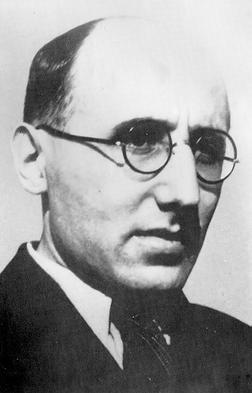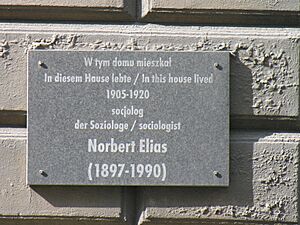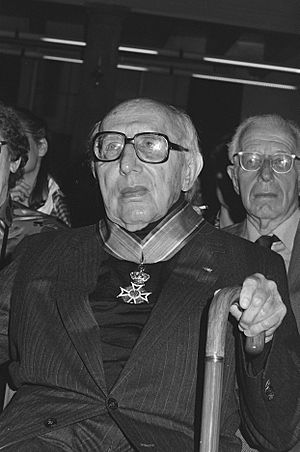Norbert Elias facts for kids
Quick facts for kids
Norbert Elias
|
|
|---|---|

Elias in 1933
|
|
| Born | 22 June 1897 |
| Died | 1 August 1990 (aged 93) Amsterdam, The Netherlands
|
| Alma mater | |
| Known for | Figurational sociology, theory of civilizing/decivilizing processes, habitus |
| Scientific career | |
| Fields | Sociology |
| Influences | Max Weber, Sigmund Freud, Karl Mannheim, Richard Hönigswald |
| Influenced | Anthony Giddens, Pierre Bourdieu, Eric Dunning, Hermann Korte, Stephen Mennell, Steven Pinker |
Norbert Elias (born June 22, 1897 – died August 1, 1990) was a German sociologist. He later became a British citizen. He is best known for his ideas about how societies become more "civilized" over time. He also studied how they can sometimes become less "civilized."
Contents
Norbert Elias's Life Story
Norbert Elias was born in 1897 in a city called Breslau. This city is now known as Wrocław and is in Poland. His father, Hermann Elias, was a businessman in the clothing industry. His mother, Sophie Elias, was from a Jewish family in Breslau.
Early Life and Education
After finishing school in 1915, Norbert Elias joined the German army. He served in World War I as a telegrapher, sending messages. After becoming unwell in 1917, he worked as a medical orderly. That same year, Elias started studying at the University of Breslau. He studied philosophy, psychology, and medicine. He also spent time studying at the universities of Heidelberg and Freiburg.
In 1919, he stopped studying medicine. To pay for his studies, he worked as a manager in a factory. In 1924, he earned his doctorate degree in philosophy. He was interested in how people behave in groups. This led him to study sociology, which is the study of society.
Moving to a New Country
Until 1925, Elias was very involved in the German Zionist movement. This movement supported a Jewish homeland. He met other young thinkers like Erich Fromm during this time. In 1925, Elias moved to Heidelberg. He planned to write another book about how modern science developed.
In 1930, he moved to Frankfurt to work as an assistant to a professor named Karl Mannheim. However, in 1933, the Nazis came to power in Germany. They closed the sociology department where Elias worked. Elias had to leave Germany and fled to Paris.
Sadly, his elderly parents stayed in Breslau. His father passed away in 1940. His mother was later taken to a concentration camp where she died in 1942.
Life in Great Britain
Elias lived in Paris for two years. He worked as a private scholar and even tried making wooden children's toys. In 1935, he moved to Great Britain. There, he worked on his most important book, The Civilizing Process. He finished it in 1939. In this book, he wrote about how societies change over time. He also described how the terrible events of the Nazi era were a "decivilizing spurt." This meant a step backward for civilization.
In 1940, during World War II, Elias was held in internment camps in Liverpool and on the Isle of Man. This was because he was German, even though he was a refugee. He was seen as an "enemy alien." While he was held, he organized lectures and even put on a play he had written.
After being released in 1941, he returned to Cambridge. He later worked for British intelligence, studying German prisoners of war. He also taught evening classes and courses at the University of Leicester. In 1952, he became a British citizen.
Academic Career and Later Years
In 1954, when he was 57 years old, Elias finally got his first steady job as a university lecturer. This was at the University of Leicester. He helped build the university's sociology department into a very important one. He retired in 1962 but continued to teach students.
From 1962 to 1964, Elias taught as a professor in Ghana, Africa. After returning to Europe in 1965, he taught at many universities in Germany and the Netherlands. From 1978, he lived in Amsterdam.
His book, The Civilizing Process, became very popular after it was re-published in 1969. Elias received many awards for his work. These included the Theodor W. Adorno Prize in 1977 and the European Amalfi Prize in 1987. He was also honored by Germany and the Netherlands. In 1998, a survey of sociologists ranked his book as one of the most important sociology books of the 20th century.
Norbert Elias passed away at his home in Amsterdam on August 1, 1990. A bridge and a street in the Netherlands have been named after him.
Norbert Elias's Key Ideas
Elias's work looked at how power, behavior, feelings, and knowledge change over time. He helped create a way of thinking called "figurational sociology." This idea looks at how people are connected in groups and how these connections shape society.
The Civilizing Process
Elias's most famous book is The Civilizing Process. It was first published in German in 1939. It wasn't widely known until it was re-published in 1969.
In this book, Elias explored how people's manners and behaviors in Europe changed over many centuries. He showed how things like violence, table manners, and how people spoke slowly became more refined. This happened as people became more connected in society. He called this change the development of the European habitus. This means the deeply learned habits and ways of behaving that become part of a person's "second nature."
Elias explained that as societies became more complex, people learned to control their impulses more. This "self-restraint" came from the growing networks of social connections. It led to the inner control that people feel, similar to what Sigmund Freud called the "super-ego." Elias also looked at how the rise of strong, central governments helped these changes happen.
Other Important Works
Elias also wrote about the sociology of knowledge and science. He wrote about sports and leisure with Eric Dunning in their book The Quest for Excitement. This book looked at how sports and games are part of the civilizing process.
In 1983, Elias set up the Norbert Elias Foundation. This foundation helps manage his writings and ideas after his death.
Elias was a very careful writer. He often found it hard to be satisfied with his work. He published only one book before he retired in 1962. But by the time he died in 1990, he had published 15 books and about 150 essays.
Collected Works in English
New editions of Elias's works are being published by University College Dublin Press. These new books are carefully checked and have notes to help readers understand them better. They include many essays that were not widely known before.
Some of the important volumes include:
- Early Writings
- The Court Society
- On the Process of Civilisation (the new title for his most famous work)
- The Established and the Outsiders
- What is Sociology?
- The Loneliness of the Dying
- Quest for Excitement: Sport and Leisure in the Civilising Process (with Eric Dunning)
- Involvement and Detachment
- An Essay on Time
- The Society of Individuals
- Studies on the Germans
- Mozart, and Other Essays on Courtly Culture
- The Symbol Theory
- Essays I: On the Sociology of Knowledge and the Sciences
- Essays II: On Civilising Processes, State Formation and National Identity
- Essays III: On Sociology and the Humanities
- Interviews and Autobiographical Reflections
- Supplements and Index to the Collected Works
There is also a special book called The Genesis of the Naval Profession.
See also
 In Spanish: Norbert Elias para niños
In Spanish: Norbert Elias para niños
 | Claudette Colvin |
 | Myrlie Evers-Williams |
 | Alberta Odell Jones |



